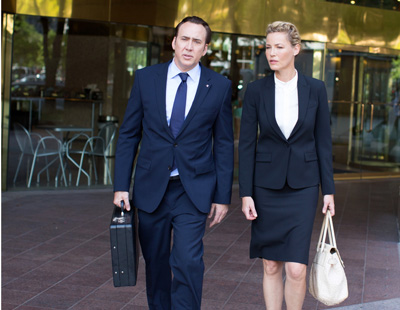
- Industry
In The Runner, the Louisiana Oil Spill Through the Indie Lens
The catastrophic Gulf of Mexico oil spill of 2010 has inspired cinematic adaptations, big and small. The small-budget, independent The Runner, opening this week, has a first time writer/director, Austin Stark, and a cast led by Nicolas Cage, Sarah Paulson, Connie Nielsen and Peter Fonda. HFPA member Elisabeth Sereda visited the set in New Orleans and got all the details.
While Mark Wahlberg and crew are about to wrap their months-long shoot of Deepwater Horizon, about the 24 harrowing hours of the biggest oil spill in U.S.-history, another – much smaller – film dealing with the same subject is opening nationwide this week. The Runner tells the story of Louisiana Congressman Colin Pryce (played by Nicolas Cage) who wants to do the right thing and go after the culprits, the powers that be at BP. His motives are not purely selfless – he is attempting a run for the Senate but his heart is in the right place. However, his plans get derailed when he becomes the center of a major sex scandal. His involvement with the daughter of a local fisherman – the very same he is seen comforting live on national TV – does not bode well for his image and political aspirations. Not to mention his marriage to a tough and ambitious businesswoman (Connie Nielsen) and his on-the-side affair with his political aide (Sarah Paulsen).
Exactly a year ago I had the chance to visit the set of The Runner in New Orleans, where the entire movie was shot. The scenes that day took place on the top floor of an office building on Tchoupitoulas Street in the Magazine District. Nicolas Cage’s Colin Pryce, looking gloomy after the revelation of his affair, is having a meeting with a Washington lobbyist played by Bryan Batt, best known for his work on Mad Men. After the lobbyist leaves, a rather heated argument ensues between Cage and Nielsen, the latter caring less about the marriage betrayal than the possibility that her husband’s career could slip back into obscurity. Judging from the dialogue it seems that Mrs. Pryce is very well aware of the congressman’s philandering.
Behind the camera a young man is giving instructions. Austin Stark is a first time writer/director from New York who came up with the idea and wrote the script: “In the beginning I just had this general idea of a politician’s career being destroyed by a scandal. And I realized it needed a specificity of a subject he is dealing with. At first I thought of bigger cities like New York or Los Angeles or Chicago, but then New Orleans with its scandal-plagued history felt like the right setting.”
Stark went to the Crescent City for three weeks to do research: “To write about the oilspill wasn’t originally what I intended to do but when I came here in 2011 it was only a year after the spill and it was still in the news. So it felt so organic in becoming a real part of the film.”
He did not base Colin Pryce on a specific real-life character but admits there are similarities to a few: “There is no one politician that I would say he’s mostly like. Obviously this idea came from seeing people like Spitzer and Weiner and Clinton go through scandals. Personality-wise he is closest to a young Bill Clinton.“
For a first time director on a low budget project, Stark got incredibly lucky with the casting. He laughs while remembering that first day on the set: “Fortunately I did have a week of rehearsing before with Nicolas Cage, so I felt a bit more comfortable. But the first day was certainly a trip!” Putting his producer’s hat on for a moment, he was very aware that Louisiana offers one of the country’s highest tax incentives for film production. As a writer that thought did not enter his mind, though: “In that moment it had nothing to do in choosing Louisiana, it just felt completely right creatively. It was only after I finished writing and started talking to people about it that there was the thought, oh yeah, and then there is the 35% tax rebate.”
The dialogue is very sophisticated and not easy for the actors. Did Stark, the director regret that Stark, the writer, had written such an eloquent piece? “Not regret, but when something doesn’t come off naturally when we are shooting a scene and a word or two have to change, I am certainly very open to it. I do let the actors interpret it in their own ways as long as it is not changing the meaning of the scenes.”
It was not just the very well crafted screenplay that attracted such big name actors – next to Cage, Nielsen and Batt, there is also Peter Fonda who plays the congressman’s father, also a politician whose career faltered after a scandal. It was the subject matter: “Especially Nic has always been very interested in environmental issues and he has lived in New Orleans before. Plus he has never done a role like this and he has been in a lot of movies. It’s a drama. Combined with his affinity for the city and the fact that he has owned property here. And Peter Fonda was very intimately involved with the oilspill. He produced the documentary about it, The Big Fix.”
Connie Nielsen is taking a break between scenes on the terrace that winds around the offices. It is 102 degrees outside but the view over the entire city and the Mississippi River is breathtaking. “I am a huge fan of political films, so there was no question in my mind that I wanted to do this after reading the script.” she says.
The Runner is a smart choice for any actor but especially for Cage in his effort to get his career back on track: an intelligently written, character-driven drama with the backdrop of an issue that dominated the news for all of 2010 and will spark more debate in the wake of Deepwater Horizon’s release next year. Given the independent nature of the project one can safely assume that Mr. Cage’s salary was lower than the cost of his trailer on his previous big-budget studio movies. Wendell Pierce and Ciera Payton (as Lucy Hall, the lover) round out the impressive cast.
Elisabeth Sereda

Photo credit: Alchemy

